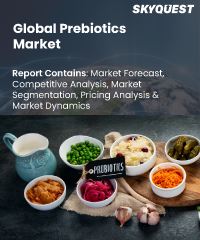
Report ID: SQMIG30H2133

Report ID:
SQMIG30H2133 |
Region:
Global |
Published Date: April, 2024
Pages:
198
|
Tables:
64 |
Figures:
74
Prebiotics Market Drivers
Increasing Demand for Dietary Supplements and Functional Foods
Prebiotics Market Restraints
Lack of Awareness
Our industry expert will work with you to provide you with customized data in a short amount of time.
REQUEST FREE CUSTOMIZATIONPrebiotics Market size was valued at USD 6.05 billion in 2021 and is expected to grow from USD 6.95 billion in 2022 to USD 21.2 billion by 2030, at a CAGR of 14.9% during the forecast period (2023-2030).
The prebiotics market is highly competitive in nature on account of the presence of a large number of players operating in the industry. These players are constantly striving to develop new and innovative products to meet the growing demand for prebiotics. These companies compete based on factors such as product innovation, product quality, pricing, and distribution channels. Other players also engage in partnerships, collaborations, and acquisitions to expand their market presence and increase their product offerings. 'Dupont Nutrition & Health', 'Cargill, Incorporated', 'Royal Cosun', 'Beneo GmbH', 'Ingredion Incorporated', 'FrieslandCampina Domo', 'Kerry Group plc', 'Yakult Honsha Co., Ltd.', 'Nexira', 'Samyang Corporation', 'Roquette Frères', 'Tate & Lyle plc', 'Beghin Meiji (Tereos Syral)', 'Cosucra Groupe Warcoing SA', 'Sensus BV', 'ADM', 'Taura Natural Ingredients Limited', 'Nutrizon', 'GTC Nutrition'
With increasing awareness of the importance of maintaining good health and well-being, there is a growing demand for functional foods and dietary supplements that contain prebiotics.
Increasing demand for natural and organic prebiotics: Consumers are increasingly seeking natural and organic products, and this trend is also reflected in the prebiotics market. Manufacturers are developing prebiotics from natural and organic sources to meet this demand.
The market in the Asia Pacific region is anticipated to grow at the quickest rate, i.e., 15.4%, between 2022 and 2030. The key forces behind product demand are nations with sizable populations and developing food and beverage industries, such as Japan, China, and India. The rising consumption of dairy products in Asian countries also contributes to the regional market's rise. According to an economic survey, India produced 198.4 million tons of milk in 2020–21, an increase of 5.7% from 2019–20. By 2030, India's demand for dairy products will amount to 266.5 million metric tons, predicts the National Dairy Development Board (NDDB).
Want to customize this report? This report can be personalized according to your needs. Our analysts and industry experts will work directly with you to understand your requirements and provide you with customized data in a short amount of time. We offer $1000 worth of FREE customization at the time of purchase.

Report ID: SQMIG30H2133